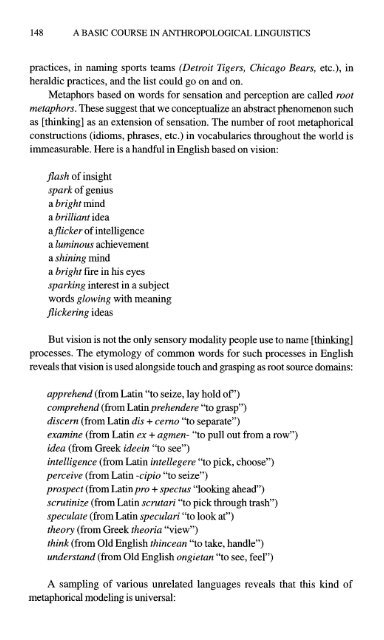A Basic Course in Anthropological Linguistics (Studies in Linguistic ...
A Basic Course in Anthropological Linguistics (Studies in Linguistic ...
A Basic Course in Anthropological Linguistics (Studies in Linguistic ...
Create successful ePaper yourself
Turn your PDF publications into a flip-book with our unique Google optimized e-Paper software.
148 A BASIC COURSE IN ANTHROPOLOGICAL LINGUISTICS<br />
practices, <strong>in</strong> nam<strong>in</strong>g sports teams (Detroit Tigers, Chicago Bears, etc.), <strong>in</strong><br />
heraldic practices, and the list could go on and on.<br />
Metaphors based on words for sensation and perception are called root<br />
metaphors. These suggest that we conceptualize an abstract phenomenon such<br />
as [th<strong>in</strong>k<strong>in</strong>g] as an extension of sensation. The number of root metaphorical<br />
constructions (idioms, phrases, etc.) <strong>in</strong> vocabularies throughout the world is<br />
immeasurable. Here is a handful <strong>in</strong> English based on vision:<br />
flash of <strong>in</strong>sight<br />
spark of genius<br />
a bright m<strong>in</strong>d<br />
a brilliant idea<br />
aflicker of <strong>in</strong>telligence<br />
a lum<strong>in</strong>ous achievement<br />
a sh<strong>in</strong><strong>in</strong>g m<strong>in</strong>d<br />
a bright fie <strong>in</strong> his eyes<br />
spark<strong>in</strong>g <strong>in</strong>terest <strong>in</strong> a subject<br />
words glow<strong>in</strong>g with mean<strong>in</strong>g<br />
flicker<strong>in</strong>g ideas<br />
But vision is not the only sensory modality people use to name [th<strong>in</strong>k<strong>in</strong>g]<br />
processes. The etymology of common words for such processes <strong>in</strong> English<br />
reveals that vision is used alongside touch and grasp<strong>in</strong>g as root source doma<strong>in</strong>s:<br />
apprehend (from Lat<strong>in</strong> “to seize, lay hold of ’)<br />
comprehend (from Lat<strong>in</strong> prehendere “to grasp”)<br />
discern (from Lat<strong>in</strong> dis + cerno “to separate”)<br />
exam<strong>in</strong>e (from Lat<strong>in</strong> ex + agmen- “to pull out from a row’’)<br />
idea (from Greek idee<strong>in</strong> “to see”)<br />
<strong>in</strong>telligence (from Lat<strong>in</strong> <strong>in</strong>tellegere “to pick, choose”)<br />
perceive (from Lat<strong>in</strong> -cipio “to seize”)<br />
prospect (from Lat<strong>in</strong> pro + spectus “look<strong>in</strong>g ahead”)<br />
scrut<strong>in</strong>ize (from Lat<strong>in</strong> scrutari “to pick through trash”)<br />
speculate (from Lat<strong>in</strong> speculari “to look at”)<br />
theory (from Greek theoria “view”)<br />
th<strong>in</strong>k (from Old English th<strong>in</strong>cean “to take, handle”)<br />
understand (from Old English ongietan “to see, feel”)<br />
A sampl<strong>in</strong>g of various unrelated languages reveals that this k<strong>in</strong>d of<br />
metaphorical model<strong>in</strong>g is universal:






